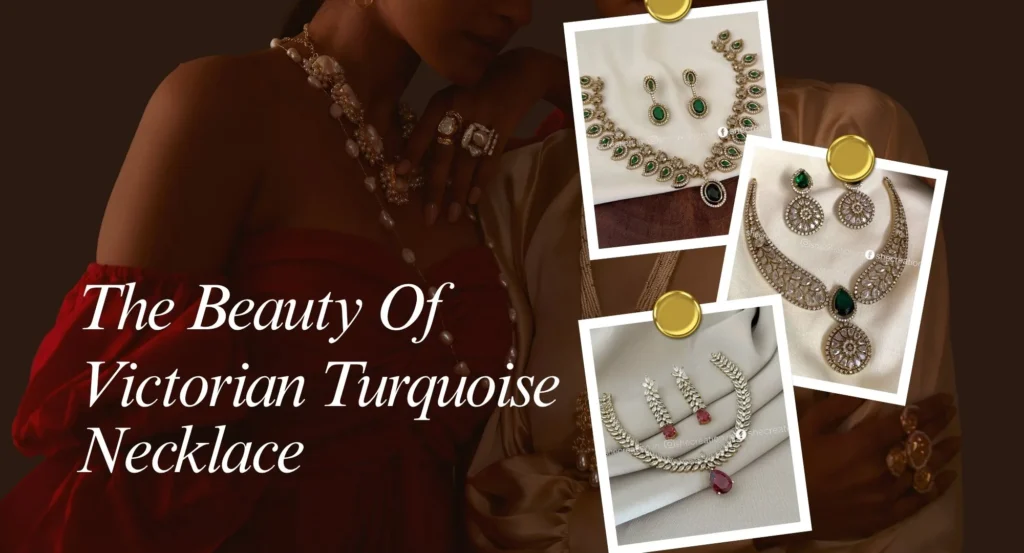Discover the Timeless Beauty of a Victorian Turquoise Necklace

The Victorian turquoise necklace is a lasting emblem of 19th-century elegance, refinement, and romantic symbolism. During Queen Victoria’s reign (1837–1901), turquoise was highly prized and frequently incorporated into jewelry designs. These necklaces often featured intricate gold settings that symbolized love and protection. Because turquoise was believed to bring good fortune, it became a favored gift among the elite. Today, Victorian turquoise necklaces are treasured not only as rare antiques but also as timeless fashion statements.
Moreover, their historical value goes beyond aesthetics. Worn by royalty and admired by commoners alike, these exquisite pieces showcase the rich cultural heritage and sentimental values of the Victorian era. Named after Queen Victoria, this style of jewelry reflects a transformative period in British art, culture, and fashion. As a result, each necklace tells a story—one of love, legacy, and enduring beauty.
Victorian Turquoise Necklace – A Pop of Color
During the Victorian era, people highly favored turquoise for its vibrant blue-green hue and symbolic meaning. As a result, the Victorian turquoise necklace emerged as a cherished emblem of protection, friendship, and eternal love. Jewelers often set these colorful pieces in gold or silver, adding intricate detailing that made them perfect for special occasions. Even today, collectors admire Victorian turquoise necklaces not only for their beauty but also for their historical and sentimental value. Consequently, they remain a standout in antique jewelry collections, celebrated for their timeless charm.
Victorian Age Jewelry – A Timeless Legacy
Victorian-age jewelry stands as one of the most admired and sought-after styles in fashion history. Emerging during Queen Victoria’s reign (1837–1901), this style blended romance, symbolism, and elegance in distinctive ways. As the era progressed, rapid industrialization and innovation began shaping new jewelry-making techniques and designs. Consequently, artisans crafted pieces with intricate metalwork, vibrant gemstones, and symbolic motifs inspired by love, nature, and spirituality. Each creation tells a deeper story—often representing devotion, mourning, or joyful celebration. Today, Victorian jewelry continues to captivate collectors and historians alike, reflecting both artistic mastery and emotional depth.
Among the most captivating designs of the Victorian era was the gothic Victorian necklace, celebrated for its dark and dramatic appeal. Jewelers crafted these pieces using black onyx, jet, or enamel, often incorporating intricate filigree and floral motifs. These necklaces gained popularity during Queen Victoria’s mourning period following the death of Prince Albert, symbolizing a somber yet commanding aesthetic. As a result, the style continues to influence modern fashion through its mysterious and sophisticated allure.
Another iconic piece from this period is the Queen Victoria diamond necklace. This dazzling creation, adorned with brilliant-cut diamonds, embodied luxury, wealth, and royal grandeur. Because diamonds were seen as symbols of eternal love and power, Queen Victoria’s collection significantly influenced the widespread appeal of diamond jewelry. Today, reproductions of these historic designs still captivate collectors and jewelry lovers worldwide.
Design Characteristics of Victorian Turquoise Necklaces
Victorian turquoise necklaces are immediately recognizable for their intricate craftsmanship and distinctive aesthetics. They typically feature a variety of design elements that echo the artistic sensibilities of the era:
1. Delicate Filigree and Metalwork
Most Victorian turquoise necklaces were handcrafted using precious metals such as gold or silver, often with ornate filigree patterns, engraving, or repousse techniques. Jewelers from this era showcased extraordinary skill in combining fine metals with turquoise cabochons or beads, creating a harmonious blend of texture and colour.
2. Naturalistic and Sentimental Motifs
Common design motifs included floral patterns, serpents, hearts, bows, and crescent moons—all of which held symbolic meaning. For example, the serpent symbolized eternal love and was frequently used in engagement jewelry. Floral designs, particularly forget-me-nots, were paired with turquoise stones to express memory and remembrance.
3. Cameos and Lockets
Turquoise often adorned lockets and cameos, which were essential components of Victorian jewelry. These lockets frequently held portraits, hair of loved ones, or mementos, making them deeply personal. Turquoise added a touch of emotional warmth to these already sentimental items.
4. Multi-Strand and Fringe Necklaces
Some Victorian turquoise necklaces highlighted multiple strands of turquoise beads or included dangling turquoise throws (fringes) that added movement and elegance to the piece. These designs were especially popular in evening wear and formal occasions.
Types of Victorian turquoise necklaces:
- Choker Necklaces – Short and close-fitting, often adorned with turquoise cabochons and delicate gold filigree work.
- Pendant Necklaces – Featuring a central turquoise stone set in an ornate gold or silver frame, often with floral or heart motifs.
- Locket Necklaces – Incorporating turquoise on the outer design, these lockets often held miniature portraits or keepsakes.
- Bib Necklaces – Elaborate multi-strand designs with turquoise beads or stones spread across the neckline. – Combining turquoise with carved cameo portraits for a striking Victorian aesthetic.
Designs and models of Victorian turquoise necklaces :
1. Floral Motif Designs
- Description: Necklaces adorned with turquoise stones arranged as flowers or leaves.
- Symbolism: Flowers represented love, attractive, nature’s elegance.
- Materials: Turquoise with gold or enamel detailing.
2. Heart-Shaped Lockets
- Description: Gold lockets in heart shapes, inlaid with turquoise cabochons.
- Symbolism: Romantic, devotion, and memory of a loved one.
- Model: Often worn as mourning or sentimental jewelry.
3. Drop or Teardrop Pendants
- Description: Central teardrop-shaped turquoise stone, hanging from a fine chain .
- Design Features: Surrounded by seed pearls or small diamonds.
- Popular Use: Evening or formal wear.
4. Cameo with Turquoise Border
- Description: Classical cameo portraits surrounded by turquoise beads or stones.
- Craft Style: Relief carving on shell or stone, paired with gold settings.
- Victorian Influence: Often worn by upper-class women as statement pieces.
Victorian Lavalier Necklace – Feminine Grace
The Victorian lavalier necklace became a favorite among women who appreciated delicate, feminine designs. Characterized by its single drop pendant that hangs gracefully from a fine chain, this style exudes elegance and charm. Often set with gemstones like amethyst, turquoise, or pearls, the lavalier necklace was considered an ideal accessory for evening wear. It remains one of the most romantic jewelry designs of the Victorian era.
Victorian Slide Necklace – A Versatile Beauty
Another innovative design of the period was the Victorian slide necklace, a long chain adorned with decorative slides that could be adjusted for length or style. Originally inspired by watch chains, these necklaces often included gemstones, enamel work, or engraved motifs. Victorian slide necklaces were popular among the elite, as they combined functionality with exquisite craftsmanship.
The Victorian turquoise necklace stands as a timeless emblem of elegance, artistry, and sentiment. Turquoise, with its captivating blue-green hues, was highly cherished during the Victorian era for its symbolism of protection, love, and prosperity. These necklaces, often set in gold or silver with intricate engravings and floral motifs, beautifully reflect the craftsmanship and romantic aesthetic of the period. Beyond its ornamental value, a Victorian turquoise necklace represents a connection to history, capturing the essence of 19th-century fashion and Queen Victoria’s influence on jewelry trends. Today, antique turquoise necklaces from the Victorian age are treasured collectibles, admired not only for their vibrant beauty but also for their rich cultural and historical significance. Owning one is like wearing a piece of art that tells the story of timeless elegance and tradition.
